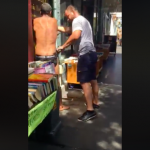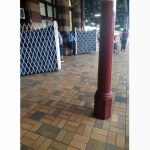NSW Police Conduct Another Illegal Roadside Strip Search

Another Facebook post relating to a dodgy strip search carried out by NSW police is currently going viral. It’s the third such piece of social media content in as many months that depicts officers who are either unsure of correct search protocol or are simply just brazenly breaching it.
The new post contains footage of two police officers conducting a search of a young white male on a Sydney suburban street at a public transport terminal. The disturbing aspect is that the officer has gone way beyond the limits of a normal pat down.
Indeed, the young man, who looks to be in his early 20s, is standing with his hands against a wall, with his jeans pulled part way down, so they sit at the bottom of his underwear. And as he’s stands in full view of pedestrians walking by, we’re arguably in the realm of the strip search.
With so many violations of search rules taking place, the clip that’s a little over a minute long reflects a now common scenario in this state: undertrained police officers unaware of the correct procedures over relying on this invasive search technique that’s meant to be used as a last resort.
Suspicion based on looks is unreasonable
“Shout out to NSW Police Force and Gladys Berejiklian for strip searching me for the reason ‘you look like you deal drugs’,” wrote the young man above the footage, which must have been filmed by a friend of his on their phone.
Clearly, the university student was told when he asked the officers why they’d chosen to search him that they thought he looked like a drug dealer. However, merely looking a certain way does not constitute a reason for an officer to stop a citizen and search them.
The powers to stop and search people without a warrant are contained in part 4 of the Law Enforcement (Powers and Responsibilities) Act 2002 (the LEPRA). Section 21 states an officer can search a person if they suspect on “reasonable grounds” they’re holding a prohibited drug or plant.
The leading authority on reasonable suspicion is 2001’s R versus Rondo, which posits that it’s “less than a reasonable belief but more than a possibility”. And simply looking like a drug dealer, wearing certain clothes, or being in a place of known drug use is not reasonable grounds for a search.
Just another roadside strip search
Section 30 of the LEPRA sets out how police officers can conduct a general search. In the case of a pat down an officer can “quickly run” their “hands over the person’s outer clothing”. Police can also have a person remove items of clothing such as a coat, gloves, shoes, socks or a hat.
The legislation says nothing about undoing pants and pulling them a third of the way down as part of a general search. That’s more of a strip search, which, as section 31 of the LEPRA stipulates, can only be done when the “seriousness and urgency of the circumstances” of the search necessitates one.
On that reckoning, the officers in the clip must have decided that the young man’s drug dealer-type appearance created such a sense of urgency that it required him to lower his jeans below his buttock in full view of the passersby on the street.
Search by touch not on
Section 33 of the LEPRA makes clear that a strip search must be conducted in a “private area” and not in “view of a person of the opposite sex”, which accounts for half of the public in the background of the clip. And a strip search must not involve an “examination of the body by touch”.
However, the first 15 seconds of the clip shows the police officer carrying out the search running his fingers under the elastic of the young man’s underwear, as well as around the top of his jeans, each time clearly coming into contact with the man’s body.
In 2017’s Fromberg v R, a Sydney man was acquitted of his drug possession conviction after it was found on appeal that he’d undergone an illegal strip search. An officer had reached under the man’s underwear elastic, which was done on the side of the road in full view of the public.
An extreme measure becomes the norm
These incidents of strip searches being conducted under sketchy circumstances are arising at a time when the use of this invasive practice by NSW police is becoming increasingly routine. Over the last four financial years, the number of strip searches carried out in this state has risen by 47 percent.
Officers conducted 3,735 strip searches in 2014-15, while 5,483 citizens were told to remove their clothes by police over 2017-18. And on average, no illicit items or substances were found 64 percent of the time.
On 13 March, Sniff Off reported there were officers with drug dogs on a platform at Central Station with strip search tents set up on the side, so they could ask commuters to remove their clothes on their way home for searches that would result in no drugs being found the majority of the time.
As the Redfern Legal Centre’s head of police accountability practice Samantha Lee related back in January, they’ve launched the Safe and Sound campaign to get the legislation changed, as at present the wording is so “vague and legalistic” it’s too open to wide interpretation.
An abuse of police powers
In January, footage was doing the rounds of the internet that showed an Aboriginal elder being searched by police on the side of Sydney’s busy Glebe Point Road. And again, the officer conducting the search ran his fingers around the elastic of the man’s underwear.
While on 5 March, a Newcastle woman posted about being strip searched by police at Olympic Park’s Hidden festival. The 19-year-old was searched in a cubicle with the door half open. No drugs were found on her, but she was thrown out of the event and banned from the precinct for 6 months.
“Once police start seeing strip searches as routine, that’s when the powers become even more likely to be abused,” NSW Greens MLC David Shoebridge told Sydney Criminal Lawyers last month. “And we’ve seen that with that young woman.”
The Greens justice spokesperson added that there must have been a clear directive “given to operational police that if their first search finds nothing, they’re to ramp it up to a strip search wherever possible”.







